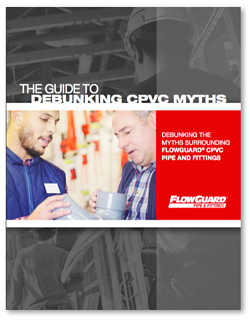FLOWGUARD® CPVC
& WATER SAFETY
As the pioneer in CPVC technology, FlowGuard® Pipe and Fittings is trusted by residential and commercial buildings around the world.
FLOWGUARD® CPVC
& WATER SAFETY
As the pioneer in CPVC technology, FlowGuard® Pipe and Fittings is trusted by residential and commercial buildings around the world.
Water Pipes & Water Safety
Families rely on their plumbing systems to deliver clean, safe drinking water. Over recent years decision-makers have neglected to consider the impact piping materials can have on water quality and system lifespans, often resulting in compromised water quality, system failures, incurring costly fixes for the home or building owner.
FlowGuard® CPVC is one of the most impervious water piping materials available to the Saudi Arabia market meeting the requirements for safe potable water applications by international standards agencies, including:
- NSF International
- Kiwa
- WRAS
- ASTM
Here’s how FlowGuard® CPVC solutions are protecting safe and clean potable water for millions of homeowners, tenants and building users:
Defending Against Chemical Leaching
Leaching occurs when impurities from the pipe surface contaminate the water running through it. All plumbing products must meet various drinking water quality standards. However, not all plumbing materials can guarantee compliance with water standards under all conditions. For example, in soft water where the pH level is below 6.5, copper piping can potentially leach metallic contaminants above the recommended limit for safe drinking water.
We routinely test FlowGuard® CPVC plumbing systems to ensure the highest standards for water quality and reliability under varying conditions and applications, which is why our CPVC technology is certified safe for drinking water by International Standards Agencies.
Protecting Against Chemical Permeation
Chemical permeation occurs when contaminants coming in contact with the exterior of the pipe are transmitted through the walls of the piping and contaminate the water. Some typical plumbing systems, such as PEX, are more susceptible to chemical permeation.
When determining your plumbing materials to ensure the highest water quality, we recommend you request technical documentation from product manufacturers demonstrating that permeation will not occur when the pipe material comes into contact with any materials such as:
- Pesticides
- Fire Stops
- Ink
- Tape
- Caulks
- Foams
- Insulation
- Thread Sealants
- Braces
- Pipe Hangers
- Fire-treated Woods
- Flexible Wire and Cables
FlowGuard® CPVC does not allow for water contamination through permeation of outside chemicals without causing a pipe failure, ensuring contaminated pot water is not consumed or used, and prompting quick remediation.
Reducing Biofilm Growth Potential

Biofilms form when biomass associated with wet environments, such as algae, fungi, and mould, cling to surfaces. This buildup can contain harmful bacteria such as Legionella, Coliform bacteria and Pseudomonas.
As the popularity of water-efficient fixtures increases, the threat of stagnation within the infrastructure also rises. Some research has shown that in domestic pipes, water can sit between one and three days before being used. In commercial buildings, this can be as high as six months.
Whilst no piping material will actively fight bacterial growth independent research has repeatedly illustrated that CPVC materials, like FlowGuard® Pipe and Fittings, are less likely to support the formation of biofilms over other common piping materials. Our CPVC solutions have a smooth, hard surface that reduces the risk of bacterial growth.
Discover how FlowGuard® CPVC eclipses other solutions available to the market, in water safety and much more.

Debunking CPVC Myths
FlowGuard® pipe and fittings are a proven reliable choice for residential plumbing applications.
.png)
-1.png)

